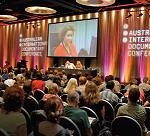AIDC 2010 preview: small world, big challenges
 The Australian International Documentary Conference reaches for global production efforts and foresees new distribution schemes. Cesar Albarran Torres spoke with three international figures who will help make this a ‘smaller world’ for docos.
The Australian International Documentary Conference reaches for global production efforts and foresees new distribution schemes. Cesar Albarran Torres spoke with three international figures who will help make this a ‘smaller world’ for docos.
Under the premise that ours “is a small world after all” the AIDC, that annual get-together of professionals of the factual content industry, is set to take place at the Hilton Adelaide next week, where documentary filmmakers, broadcasters and key decision-makers will gather in order to find ways of getting things done in the globalised and ever-changing scenario of the genre.
Focusing on co-productions, the organisers seek to lay down the foundation of a creative and business network between Australia and other countries.
The emergence of new distribution methods and the role of the web 3.0 in this industry will also be explored, as well as the impact of technologies such as GPS and other mapping devices.
As in past editions, the conference will be host to various events: screenings, master classes, workshops for documentary filmmakers, marketplace initiatives such as pitch sessions and Australia’s first factual film festival, F4.
PARTICIPATORY DISTRIBUTION
The international spirit will be reflected on the list of speakers scheduled to share their experience in the craft of capturing reality on screen, such as longtime producer and filmmaker Wendy Levy, from San Francisco, California.
Levy, director of creative programming at BAVC (Bay Area Video Coalition) and director of the Producers Institute for New Media Technologies, believes that fresh distribution methods constructed over the Internet will help democratise the medium.
“What’s interesting to me is the hybridisation of distribution: people have to really think outside the traditional box by creating new ways to reach core audiences.
“The question is not just how we use the web to send our content to people, but finding patterns in which they can reach in and choose what they want. It is very important that producers, the people that are creating these stories, are the ones who are helping develop those streams.”
Levy recently spoke about new distribution methods at the Sundance Film Festival. But whether at Park City, Utah or Adelaide, South Australia, Levy foresees a generational gap looming over the factual content industry: “Producers who are from the old school want to just make a documentary and give it over to someone else to distribute. If you are going to tell stories you have to be engaged in helping these stories reach audiences.”
Having been invited to take part in the Latino Film Festival in the US and as one of the directors at the board of the International Gay and Lesbian Human Rights Commission, Levy envisions factual content as a channel through which otherwise silenced voices can be heard.
“In documentaries, there is so much potential in those stories to aid transformation and to help people living in communities have better lives, because stories incite movement… documentaries will be distributed in so many platforms and it’s all going to be participatory,” she said.

